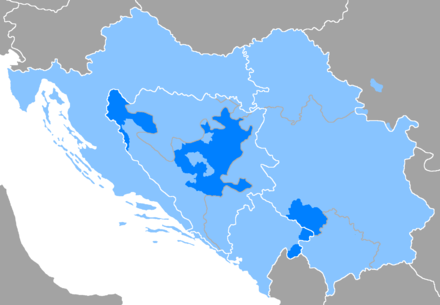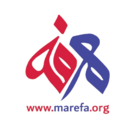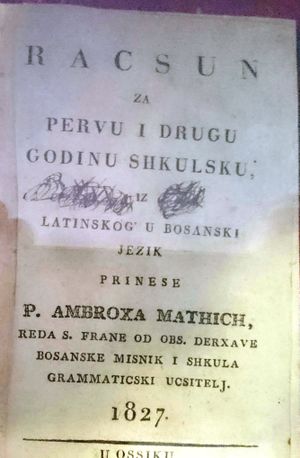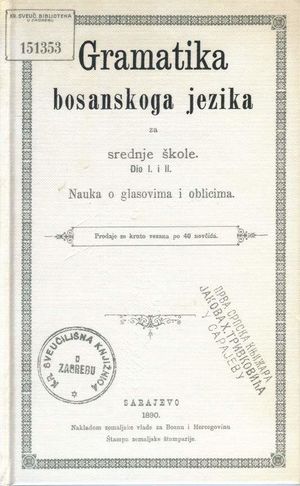اللغة البوسنية
| البوسنية | |
|---|---|
| bosanski / босански | |
| النطق | [bɔ̌sanskiː] |
| موطنها | البوسنة |
| العرق | البوسنيون |
الناطقون الأصليون | 2.5–3 مليون (2008)[1] |
| اللاتينية (أبجدية گاي) الكيريلية (أبجدية ڤوك)[Note 1] برايل اليوغسلاڤية سابقاً: العربية (عربيتسا) الكيريلية البوسنية (بوسانچيتسا) | |
| الوضع الرسمي | |
لغة رسمية في | |
لغة أقلية معترف بها في | |
| أكواد اللغات | |
| ISO 639-2 | bos |
| ISO 639-2 | bos |
| ISO 639-3 | bos |
| Glottolog | bosn1245 |
| Linguasphere | جزء من 53-AAA-g |
 | |
اللغة البوسنية (bosanski / босански [bɔ̌sanskiː]) هي لغة البشناق المبنية على اللهجة الشتوكافية و المنتمية لعائلة اللغات السلافية الجنوبية.
تقترب اللغة البوسنية من الصربية و الكرواتية حيث كانت هذه اللغات حتى تفكك يوغسلافيا (1991) مجتمعة في لغة واحدة تدعى الصربوكرواتية.[3][4] البوسنية هي واحدة من ثلاث تنويعات تُعتبر لغات رسمية في البوسنة والهرسك،[5] بجانب الكرواتية والصربية. وهي أيضاً معترف بها رسمياً كلغة أقلية أو لغة إقليمية في صربيا،[6] والجبل الأسود،[7] و كوسوڤو.[8][a]
تكتب البوسنية رسميا باستخدام كل من الأبجدية اللاتينية والأبجدية الكيريلية،[Note 1] لكن اللاتينية هي الأكثر شيوعا.[9] وتتميز البوسنية عن الصربو-كرواتية بعدد كبير من الكلمات المستعارة من العربية والتركية العثمانية والفارسية، بسبب تفاعل اللغة مع تلك الثقافات عبر الروابط الإسلامية.[10][11][12]
كما استخدمت أيضا البوسانچيتسا Bosančica (سيريلية بوسنية) و أرابيتسا Arabica (تستخدم الحروف العربية).
يرفض بعض اللغويون الصرب و الكروات تسمية اللغة بالبوسنية ويفضلون بدل ذلك البشناقية باعتبارها لغة البشناق و ليست لغة دولة البوسنة و الهرسك ككل كما يوحي اسم البوسنية.
. . . . . . . . . . . . . . . . . . . . . . . . . . . . . . . . . . . . . . . . . . . . . . . . . . . . . . . . . . . . . . . . . . . . . . . . . . . . . . . . . . . . . . . . . . . . . . . . . . . . . . . . . . . . . . . . . . . . . . . . . . . . . . . . . . . . . . . . . . . . . . . . . . . . . . . . . . . . . . . . . . . . . . . .
التاريخ
العيارية

بالرغم من أن البوسنيين هم، على مستوى اللغة المحكية، لغوياً هم أكثر تجانساً من الصرب أو الكروات، إلا أنهم على العكس من هذين العرقين قد فشلوا في تدوين لغة عيارية (فصحى) في القرن التاسع عشر، لسببين حاسمين على الأقل:
- النخبة البوسنية، لالتحامها بالحياة العثمانية، كانت تكتب باللغات التركية والعربية والفارسية.[13] الأدب العامي مكتوباً بالبوسنية بكتابة عربيتسا كان قليلاً نحيلاً.
- تأخر الاستقلال الوطني للبوسنيين عن نظيريه الصربي والكرواتي، وبسبب القواسم المشتركة مع التركية والعربية والفارسية، فقد كان لذك دورا محورياً في عدم إثارة مشروع اللغة البوسنية الكثير من الاهتمام والدعم بين مثقفي ذلك العصر.
| لاتينيتسا | A | B | C | Č | Ć | D | Dž | Đ | E | F | G | H | I | J | K | L | Lj | M | N | Nj | O | P | R | S | Š | T | U | V | Z | Ž | |
|---|---|---|---|---|---|---|---|---|---|---|---|---|---|---|---|---|---|---|---|---|---|---|---|---|---|---|---|---|---|---|---|
| عربيتسا | منفصل | آ | ب | ڄ | چ | ڃ |
د | ج | ە | ف | غ | ح | اٖى | ي | ق | ل | ڵ | م | ن | ںٛ ݩ |
ۉ | پ | ر | س | ش | ت | ۆ | و | ز | ژ | |
| Initial | بـ | ڄـ | چـ | ڃـ |
جـ | فـ | غـ | حـ | اٖىـ | يـ | قـ | لـ | ڵـ | مـ | نـ | ٮٛـ ݩـ |
پـ | ر | سـ | شـ | تـ | ||||||||||
| Medial | ـآ | ـبـ | ـڄـ | ـچـ | ـڃـ |
ـد | ـجـ | ـە | ـفـ | ـغـ | ـحـ | ـاٖىـ ـٖىـ |
ـيـ | ـقـ | ـلـ | ـڵـ | ـمـ | نـ | ـٮٛـ ـݩـ |
ـۉ | ـپـ | ـر | ـسـ | ـشـ | ـتـ | ـۆ | ـو | ـز | ـژ | ||
| Final | ـب | ـڄ | ـچ | ـڃ |
ـج | ـف | ـغ | ـح | ـاٖى ـٖى |
ـي | ـق | ـل | ـڵ | ـم | ـن | ـںٛ ـݩ |
ـپ | ـر | ـس | ـش | ـت | ||||||||||
The literature of the so-called "Bosnian revival" at the start of the 20th century was written in an idiom that was closer to the Croatian standard than to the Serbian one: it was a western Shtokavian dialect with an Ijekavian accent and used a Latin script, but had recognizable Bosnian lexical traits. The main authors were the polymath, politician and poet Safvet-beg Bašagić and the storyteller Edhem Mulabdić.
The modern Bosnian standard took shape in the 1990s and 2000s. Lexically, Islamic-Oriental loanwords are more frequent; phonetically: the phoneme /x/ (letter h) is reinstated in many words as a distinct feature of vernacular Bosniak speech and language tradition; also, there are some changes in grammar, morphology and orthography that reflect the Bosniak pre-World War I literary tradition, mainly that of the Bosniak renaissance at the beginning of the 20th century.
. . . . . . . . . . . . . . . . . . . . . . . . . . . . . . . . . . . . . . . . . . . . . . . . . . . . . . . . . . . . . . . . . . . . . . . . . . . . . . . . . . . . . . . . . . . . . . . . . . . . . . . . . . . . . . . . . . . . . . . . . . . . . . . . . . . . . . . . . . . . . . . . . . . . . . . . . . . . . . . . . . . . . . . .
معرض صور
Nauk krstjanski za narod slovinski, by Matija Divković, the first Bosnian printed book. Published in Venice, 1611
Bosnian dictionary by Muhamed Hevaji Uskufi Bosnevi, 1631
الجدل والاعتراف

The name "Bosnian language" is a controversial issue for some Croats and Serbs, who also refer to it as the "Bosniak" language (الصربية الكرواتية: [bošnjački] Error: {{Lang}}: text has italic markup (help) / бошњачки; [bǒʃɲaːtʃkiː]). Bosniak linguists however insist that the only legitimate name is "Bosnian" language (bosanski), and that that is the name that both Croats and Serbs should use. The controversy arises because the name "Bosnian" may seem to imply that it is the language of all Bosnians, while Bosnian Croats and Serbs reject that designation for their idioms.
الفروق بين البوسنية والكرواتية والصربية
The differences between the Bosnian, Serbian, and Croatian literary standards are minimal. Although Bosnian employs more Turkish, Persian, and Arabic loanwords—commonly called orientalisms—it is very similar to both Serbian and Croatian in its written and spoken form.[14] "Lexical differences between the ethnic variants are extremely limited, even when compared with those between closely related Slavic languages (such as standard Czech and Slovak, Bulgarian and Macedonian), and grammatical differences are even less pronounced. More importantly, complete understanding between the ethnic variants of the standard language makes translation and second language teaching impossible."[15]
The Bosnian language, as a new normative register of the Shtokavian dialect, was officially introduced in 1996 with the publication of Pravopis bosanskog jezika in Sarajevo. According to that work, Bosnian differed from Serbian and Croatian on some main linguistic characteristics, such as: sound formats in some words, especially "h" (kahva versus Serbian kafa); substantial and deliberate usage of Oriental ("Turkish") words; spelling of future tense (kupit ću) as in Croatian but not Serbian (kupiću) (both forms have the same pronunciation).[16][بحاجة لمصدر أفضل] 2018, in the new issue of Pravopis bosanskog jezika, words without "h" are accepted due to their prevalence in language practice.<ref>Halilović, Senahid (26 April 2018). "Halilović za N1: Dužni smo osluškivati javnu riječ" [Halilović for N1: We Have to Listen to the Public Word]. TV show N1 na jedan (host Nikola Vučić) (in Serbo-Croatian). Sarajevo: N1 (TV channel). Retrieved 26 November 2019.{{cite web}}: CS1 maint: unrecognized language (link) (6-13
انظر أيضاً
Notes
| a. | ^ Kosovo is the subject of a territorial dispute between Serbia and the local Albanian majority. The Assembly of Kosovo declared its independence on 17 February 2008, a move that is recognised and the Republic of China (Taiwan), but not by Serbia, which claims it as part of its sovereign territory. |
- ^ أ ب الكيريلية هي أبجدية معترف بها رسمياً، ولكن فعلياً تُستخدم أساساً في جمهورية صرب البوسنة، بينما في اتحاد البوسنة والهرسك فأساساً اللاتينية هي المستخدمة.[2]
المراجع
- ^ "Accredited Language Services: An Outline of Bosnian Language History". Accredited Language Services. Archived from the original on 1 August 2016. Retrieved 12 August 2012.
- ^ Alexander 2006, pp. 1–2.
- ^ Benjamin V. Fortson, IV, Indo-European Language and Culture: An Introduction, 2nd ed. (2010, Blackwell), p. 431, "Because of their mutual intelligibility, Serbian, Croatian, and Bosnian are usually thought of as constituting one language called Bosnian-Croatian-Serbian."
- ^ Václav Blažek, "On the Internal Classification of Indo-European Languages: Survey" retrieved 20 Oct 2010, pp. 15–16.
- ^ انظر Art. 6 of the Constitution of the Federation of Bosnia and Herzegovina, available at the official website of Office of the High Representative in Bosnia and Herzegovina
- ^ "European charter for regional or minority languages: Application of the charter in Serbia" (PDF). مجلس أوروپا. 2009. Archived from the original (PDF) on 2014-01-03.
- ^ خطأ استشهاد: وسم
<ref>غير صحيح؛ لا نص تم توفيره للمراجع المسماةMontenegroConstitution - ^ Driton Muharremi and Samedin Mehmeti (2013). Handbook on Policing in Central and Eastern Europe. Springer. p. 129. ISBN 9781461467205.
- ^ Tomasz Kamusella (15 January 2009). The Politics of Language and Nationalism in Modern Central Europe. Palgrave Macmillan. ISBN 978-0-230-55070-4.
In addition, today, neither Bosniaks nor Croats, but only Serbs use Cyrillic in Bosnia.
- ^ Algar, Hamid (2 July 1994). Persian Literature in Bosnia-Herzegovina. Oxford. pp. 254–68.
{{cite book}}:|work=ignored (help)CS1 maint: location missing publisher (link) - ^ Balić, Smail (1978). Die Kultur der Bosniaken, Supplement I: Inventar des bosnischen literarischen Erbes in orientalischen Sprachen. Vienna: Adolf Holzhausens, Vienna. p. 111.
- ^ Balić, Smail (1992). Das unbekannte Bosnien: Europas Brücke zur islamischen Welt. Cologne, Weimar and Vienna: Bohlau. p. 526.
- ^ "Collection of printed books in Arabic, Turkish and Persian". Gazi Husrev-begova biblioteka. 2014-05-16. Retrieved 2014-05-16.
- ^ "Serbian, Croatian, Bosnian, Or Montenegrin? Or Just 'Our Language'?". Radio Free Europe.
- ^ Šipka, Danko (2019). Lexical layers of identity: words, meaning, and culture in the Slavic languages. New York: Cambridge University Press. p. 166. doi:10.1017/9781108685795. ISBN 978-953-313-086-6. LCCN 2018048005. OCLC 1061308790.
- ^ Sotirović 2014, p. 48.
Further reading
- Alexander, Ronelle (2006). Bosnian, Croatian, Serbian, a Grammar: With Sociolinguistic Commentary. pp. 1–2. ISBN 9780299211936.
{{cite book}}: Invalid|ref=harv(help) - Gröschel, Bernhard (2001). "Bosnisch oder Bosniakisch?" [Bosnian or Bosniak?]. In Waßner, Ulrich Hermann (ed.). Lingua et linguae. Festschrift für Clemens-Peter Herbermann zum 60. Geburtstag. Bochumer Beitraäge zur Semiotik, n.F., 6 (in German). Aachen: Shaker. pp. 159–188. ISBN 978-3-8265-8497-8. OCLC 47992691.
{{cite book}}: CS1 maint: unrecognized language (link) - Kafadar, Enisa (2009). "Bosnisch, Kroatisch, Serbisch – Wie spricht man eigentlich in Bosnien-Herzegowina?" [Bosnian, Croatian, Serbian – How do people really speak in Bosnia-Herzegovina?]. In Henn-Memmesheimer, Beate; Franz, Joachim (eds.). Die Ordnung des Standard und die Differenzierung der Diskurse; Teil 1 (in German). Frankfurt am Main: Peter Lang. pp. 95–106. OCLC 699514676.
{{cite book}}: External link in|chapterurl=|chapterurl=ignored (|chapter-url=suggested) (help)CS1 maint: unrecognized language (link) - Kordić, Snježana (2005). "I dalje jedan jezik" [Still one language]. Sarajevske Sveske (in Serbo-Croatian). Sarajevo (10): 83–89. ISSN 1512-8539. SSRN 3432980. قالب:CROSBI. قالب:ZDB. Archived from the original on 21 September 2013. Retrieved 22 August 2014.
{{cite journal}}: CS1 maint: unrecognized language (link) (COBISS-BH). - Kordić, Snježana (2011). "Jezična politika: prosvjećivati ili zamagljivati?" [Language policy: to clarify or to obscure?]. In Gavrić, Saša (ed.). Jezička/e politika/e u Bosni i Hercegovini i njemačkom govornom području: zbornik radova predstavljenih na istoimenoj konferenciji održanoj 22. marta 2011. godine u Sarajevu (in Serbo-Croatian). Sarajevo: Goethe-Institut Bosnien und Herzegowina ; Ambasada Republike Austrije ; Ambasada Švicarske konfederacije. pp. 60–66. ISBN 978-9958-1959-0-7. OCLC 918205883. SSRN 3434489. قالب:CROSBI.
{{cite book}}:|archive-url=requires|url=(help); External link in|chapterurl=|authormask=ignored (|author-mask=suggested) (help); Unknown parameter|chapterurl=ignored (|chapter-url=suggested) (help)CS1 maint: unrecognized language (link) (ÖNB). - Sotirović, V.B. (2014). "BOSNIAN LANGUAGE AND ITS INAUGURATION: THE FATE OF THE FORMER SERBOCROAT OR CROATOSERB LANGUAGE". Sustainable Multilingualism. 3 (3): 47–61. doi:10.7220/2335-2027.3.5.
{{cite journal}}: Invalid|ref=harv(help)  This article contains material from the CIA World Factbook (2006 edition) which, as a U.S. government publication, is in the المشاع.
This article contains material from the CIA World Factbook (2006 edition) which, as a U.S. government publication, is in the المشاع.
. . . . . . . . . . . . . . . . . . . . . . . . . . . . . . . . . . . . . . . . . . . . . . . . . . . . . . . . . . . . . . . . . . . . . . . . . . . . . . . . . . . . . . . . . . . . . . . . . . . . . . . . . . . . . . . . . . . . . . . . . . . . . . . . . . . . . . . . . . . . . . . . . . . . . . . . . . . . . . . . . . . . . . . .
وصلات خارجية
- Basic Bosnian Phrases
- Learn Bosnian – List of Online Bosnian Courses
- English–Bosnian dictionary on Glosbe
- Gramatika bosanskoga jezika za srednje škole. Dio 1. i 2., Nauka o glasovima i oblicima. Sarajevo: National government of Bosnia and Hercegovina, National Printing House. 1890.
- Буквар: за основне школе у вилаjету босанском. Sarajevo: Vilayet Printing House. 1867.
قالب:Languages of Bosnia and Herzegovina قالب:Bosnia and Herzegovina topics2
- CS1 errors: periodical ignored
- CS1 maint: location missing publisher
- Articles containing صربو-كرواتية-language text
- Languages with ISO 639-2 code
- Languages with ISO 639-1 code
- ISO language articles citing sources other than Ethnologue
- Articles with hatnote templates targeting a nonexistent page
- Articles containing بوسنية-language text
- Lang and lang-xx template errors
- Articles containing صربية-language text
- All pages needing factual verification
- Wikipedia articles needing factual verification from February 2019
- CS1 errors: unsupported parameter
- CS1 errors: archive-url
- مقالات المعرفة المتضمنة نصوصاً من كتاب حقائق العالم
- الثقافة البشناقية
- اللغة البوسنية
- لغات ألبانيا
- لغات البوسنة والهرسك
- لغات كرواتيا
- لغات صربيا
- لغات الجبل الأسود
- لغات كوسوڤو
- لغات تركيا
- لغات سلافية جنوبية








